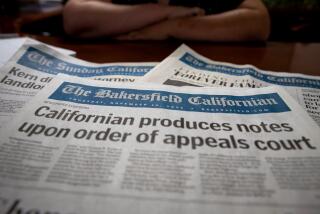A Complicated Matter of Who Said What
- Share via
I am troubled by the recent federal appeals court ruling that a journalist may deliberately alter or fabricate quotations from public figures provided that the fabrications reflect the essence of what was actually said.
The ruling apparently echoed the landmark Supreme Court ruling in New York Times vs. Sullivan, 1964, which held that in a libel suit brought by a public figure the plaintiff must show that the objectionable material was not only false but intentionally malicious.
The press hailed Sullivan as a hardening of its shield, a reinforcement of its First Amendment rights. Sullivan has encouraged the press to report the news without fear. We would not give it up without a fight.
As a reporter, though, I have sometimes wondered what divides ordinary citizens from public figures. Does a bartender whose daughter has been kidnaped and murdered suddenly become a public figure?
The point is that any good reporter would no more misquote a grieving bartender than he would a dishonest U.S. senator, and vice versa. Sullivan protects the press from frivolous, vain or political suits; but it should not relieve the press of its duty to report the facts accurately, and that, to me, includes every quoted word.
What shocked me about the recent ruling is that it appears to assume that the media routinely invent, fabricate or distort quotations for their own ends, whether to make them more dramatic or to suit the reporter’s preconceptions of the story.
I do not believe that is generally true. Indeed, there may be many reporters who are sloppy about quotes, and some who deliberately change them, or even make them up. They do not belong in the business.
Especially today, when most reporters are armed with tape recorders, there is no excuse for misquoting anyone. The reporter’s job is hard enough. He must, in the name of brevity, excerpt brief quotes from much longer statements; in doing this he must not distort the whole meaning; he must try to extract its essence. That is not easy, and it is why a reporter needs a great deal more skill than just knowing how to read and write.
Surprisingly, the recent ruling arose from a suit against the usually impeccable New Yorker, in which a writer, Janet Malcolm, allegedly attributed invented quotations to Jeffrey E. Masson, a writer-psychoanalyst. Among numerous other transgressions, Malcolm allegedly quoted Masson as calling himself an “intellectual gigolo,” an epithet he denied using.
Though Masson’s remarks might indeed suggest that he was an “intellectual gigolo,” the phrase is too damning to be attributed to him unless he actually said it.
Of course the court was not presuming to tell the media what their ethics should be. It was merely protecting them against harassment for misquotations that were, in the long run, harmless. We should be grateful.
However, I was glad to see that the editors of several influential newspapers, including The Los Angeles Times, were quick to respond that their reporters are strictly forbidden from tampering with quotes. Said Peter Silberman, managing editor of the Washington Post, “You do not change quotes and you certainly do not make up quotes.”
That has been my rule for 40 years. Early on I discovered that there was much more life and drama in the way people actually said things than in any other version I could make up. Also, I recognized that a person’s speech, more than his clothes, makes the man (or woman). Whether I was interviewing an emperor, an ex-President, the Army chief of staff, a serial murderer or a striptease dancer--all of which I have--I was meticulous in quoting them accurately.
I try to be accurate even if I am quoting anonymous people, who would have no legal recourse. If I quote a waitress as saying, “Hi. I’m Cindy. Lousy day, isn’t it?” you can believe that that’s exactly what she said. If she happens to read my column the next day I want her to say, “Hey, that’s me he’s talking about! That’s what I said !”
I often quote from letters. Often very briefly. But I always try to make the quote reflect the whole, impossible as that may be.
From time to time, also, I have quoted my wife. To me, she is no different from any other public figure. I always put down exactly what she said.
Well, almost always.
More to Read
Get the L.A. Times Politics newsletter
Deeply reported insights into legislation, politics and policy from Sacramento, Washington and beyond. In your inbox twice per week.
You may occasionally receive promotional content from the Los Angeles Times.










